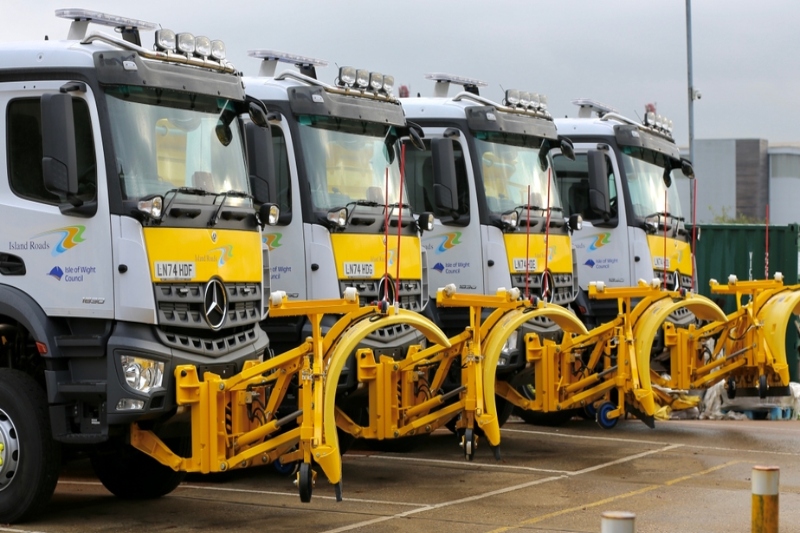Air pollution has risen up the national agenda recently. Channel 4's Dispatches exposed the shocking levels of pollution that school children encounter every day and Newham has become the first UK council to install air monitoring equipment in schools. Jason Airey and Glen Davies talk to LAPV about the myths and challenges of tackling air pollution.
There are lots of misconceptions about air pollution and lots of people have their heads in the sand,' says Jason Airey MD of connected fleet specialist CMS SupaTrak and organiser of the OWL (Optimised Waste & Logistics) partnership. This year OWL launched the Clean Air Project. Using OWL's country-wide roadshows, the partnership has focused on education around air pollution and is examining how the waste and logistics industries can do more. Jason argues that air pollution is not yet well understood and this impacts mitigation strategies.
Take air quality monitoring. Static monitors are widely used by councils to sample air quality, but they only take readings in specific spots, which raises certain issues. For example, the readings could be very different from another part of the same road. In addition, some of the static monitors in use don't measure all the different gasses and particulates that make up air pollution and so it can be argued that static monitors can provide a misleading, and at times convenient, picture.
‘The problem is that everyone is scared of the data,' says Jason. ‘Understandably, no council wants to be branded as the worst in the country for air quality just because they are monitoring it more thoroughly than their neighbours.'
But Jason believes that honest and robust monitoring is, in fact, the key to coming up with successful solutions and this is why CMS SupaTrak is taking on the problem. ‘It is only when you fully understand the problem that you can truly tackle it. Otherwise, your efforts might have no impact at all.'
CMS has been in business for more than 25 years and the business has evolved as industry challenges have changed and emerging technology has enabled the development of new solutions. ‘We believe that not only does it make commercial sense for us to be at the forefront of new technologies related to air quality monitoring, but that we also have a moral obligation and corporate responsibility to drive up standards within our industry and to push for beneficial change for the good of us all,' says Jason.
OWL is currently working with its partners to evaluate how multi-purposing refuse trucks with mobile air quality monitoring devices can provide a more accurate picture of air pollution. Refuse vehicles already tour the same streets regularly, so the idea is to use them to capture real-time air quality data. Pollution is affected by a myriad of factors, including weather conditions, how buildings are positioned, and volumes of traffic, so simple steps such as changing sign-posted routes for pedestrians and cyclists to avoid certain points at certain times in certain months could make a positive difference. 'Accurate and real-time data provides the level of detail required to take these decisions and change behaviours,' argues Jason.
Earlier this year Dennis Eagle fitted CMS's mobile air quality monitor to its demo truck and data has been plotted onto a heat map. ‘It has been a real eye-opener,' says Jason. ‘The data we're seeing is helping councils really understand in detail when and where their problem areas are and how they are performing against UK and WHO targets.'
The OWL Clean Air Project has support from Parliament. Barry Sheerman MP is Chairman of OWL and he also chairs the Global Network for Road Safety Legislators and is Chairman of the UK's Parliamentary Advisory Council for Transport Safety. Later this year OWL plans to set up the Clean Air Committee with the purpose of advising on the introduction of improved laws and standards for air quality monitoring.
City of London ' embracing better data
The City of London Council is a forward-thinking council that has been working closely with OWL to better understand pollution data. ‘The council wanted to start by ensuring the quality of data from the mobile monitors,' explains Jason. ‘It is hard to believe but there's currently no certification for short-form monitors so we've had to prove that ours are accurate.
'For several months our mobile data has been compared to City of London's static data and ratified. The City of London is now confident that our monitors are robust, and they are happy to progress with the installation of mobile monitors onto a Euro VI refuse vehicle.'
Impact on workforce
Another topic that most people would rather not think too much about is the effect of air pollution on those who drive vehicles for a living.
Glen Davies from H2H Solutions, who helped establish FORS while working at TfL, is now an independent consultant working with vehicle operators, manufacturers, regulators, and lobby groups for healthier and safer streets.
‘It is well documented that professional drivers have a reduced life expectancy,' says Glen. 'This is often attributed to lifestyle choices, such as unhealthy diets and insufficient exercise, but we are now seeing emerging evidence that in-cab pollution can contribute to poor health. Not only is this bad news for professional drivers, but it also means that employers that don't address this could be perceived as not doing enough to protect the health of their employees.'
The British Heart Foundation's research shows that air pollution affects our hearts and circulation by damaging the walls of blood vessels, making them narrower and harder. This increases blood pressure, makes blood more likely to clot, and ultimately leads to an increase in heart attacks and strokes.
‘It is a common misconception that keeping the windows closed and relying on a vehicle's in-cab filters will help,' says Glen. ‘The gases and particles of pollution that are so damaging to health ' PM2.5 and NOx ' are far too small to be captured. It is also a misconception that drivers of electric vehicles are less affected. Current technology means that, because of reduced energy available to systems other than the engine, EVs can actually have less effective ventilation systems.'
But it's not all bad news. Manufacturers of some vehicles are already ahead of the game. Road sweepers, by their very nature, lift up dirt and particles of pollution into the atmosphere and for some time have been identified as a contributor to the problem. This has led to the introduction of pollution standards to protect pedestrians and it is now possible to purchase road sweeper vehicles that incorporate filters specially designed to protect the driver.
Sources of pollution
So, where is all this air pollution coming from? You would be forgiven for assuming that it is all down to the so-called cleaner types of diesel that turned out to be a bit too good to be true. However, many things contribute to poor air quality, including particles from brake dust and tyres, static polluters such as fast-food restaurants, the burning of fossil fuels, and even weather conditions.
According to the World Health Organisation, air pollution accounts for seven million premature deaths worldwide every year, and the Royal College of Physicians estimates that it is responsible for 40,000 premature deaths in the UK every year. Moreover, around 91% of the world's population live in areas that exceed the WHO's guideline limits.
These are sobering figures, but there are steps we can all take to make a difference. Firstly, councils should educate themselves about air pollution. You can join the OWL Clean Air Project. Become an OWL Clean Air Partner and contribute to driving vital change in our industry and help to introduce new laws and standards that will save lives. OWL Clean Air Partners can also access turn-key information and materials to help enhance their corporate social responsibility profiles.
To find out more about OWL and the OWL Clean Air Project go to www.supatrak.com/owl.
The next OWL Roadshow takes place in Belfast, Northern Ireland, on
3 October 2019. To register for the event go to:







